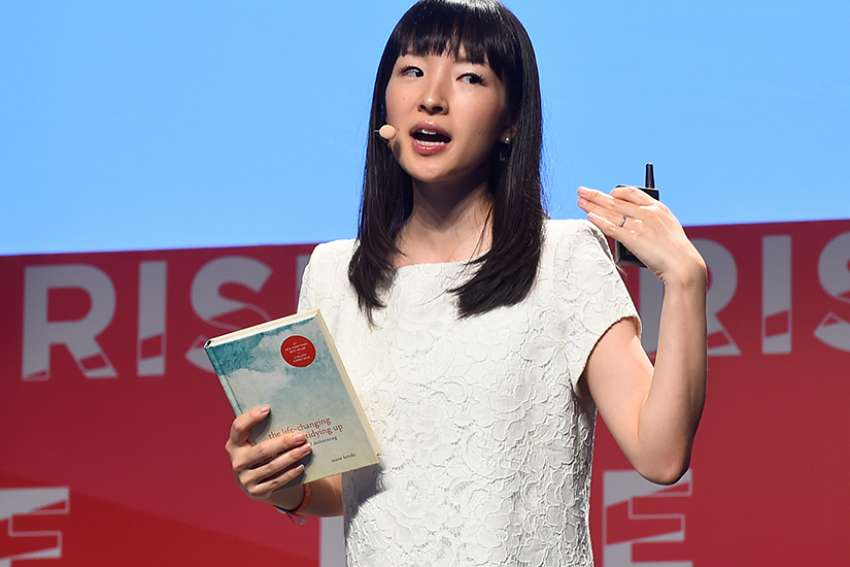“I spend my money on what I consider to be important,” he wrote. “Look at the financial statement of any organization, or family, or individual, to find out what is considered important.”
That is to say, our Visa or MasterCard statements can be a guide when we try to understand what tangible items or causes we emphasize the most. For many of us, those statements would read like a menu of our favourite consumer pleasures.
Consumerism clutters our connection to God, and it degrades our inherent human dignity by elevating the premise that we must have certain material goods in order to measure up to societal standards. The reality couldn’t be further from the truth.
“Does it spark joy?” This is the fundamental question Japanese tidying expert and global sensation Marie Kondo enthusiastically poses to clients when helping them decide whether to keep or throw out clutter-causing items in a living space. Her strategic approach to doing something most people hate — getting rid of possessions — has come to life in her smash Netflix series, Tidying Up with Marie Kondo, based on her New York Times bestseller The Life-Changing Magic of Tidying Up.
Kondo’s method is simple. Wade through your mess according to the following categories: clothing, then books, then paper documents, then komono — which translates to “miscellaneous” in Japanese — comprising items stashed away in the bathroom, kitchen and garage.
The final, and often hardest category, is sentimental items. At each stage, put all items in a pile and keep only what “brings you joy.”
I can’t say that I’ve fully embraced this tidying method, but I have dabbled in it. Watching the series spurred me to clean my pantry and linen closet, which had both slowly been falling into a state of overloaded untidyness.
I can see why Kondo has a cult-like following of adoring fans. Developing a regular tidying strategy is a sound idea. But keeping a home organized will only work over the long-term if we acknowledge and work through our obsession with stuff. If we continually bring more and more into the home as a result of obsessive shopping habits, the clutter will soon re-emerge. The real solution is to buy less.
As we enter the Lenten season, I’ve seen multiple calls to action on social media to try to avoid buying anything new during our pre-Easter fast, as a “consumer penance” of sorts.
Consumerism is the root of the problem. It spurs our compulsion to buy because we mistakenly feel that buying things will “bring us joy.” Kondo’s series is powerful because it highlights how emotionally connected we are to our possessions.
In one episode, we meet Mario, who once owned more than 160 pairs of sneakers.
“When I became an adult and as I started having an income (shoes) were a priority,” he said. “And I started buying, and it got out of control. Ninety-five per cent of them were never used, never unlaced, let alone tried on.”
By the end of the episode, he reduced his prized collection to 45 pairs, and he and his wife created space in their home to welcome a new baby.
In his pastoral letter, Cardinal Collins writes: “It is interesting that we are often called consumers. What a shame it is that we can be identified as people who are simply consuming the goods of the Earth.
“Inevitably, if that consumption becomes the mark of a greedy life, then we will ourselves be consumed and possessed by the goods that we consume. It is far better to see all such things in proper perspective. The time, talent and treasure that we briefly enjoy are gifts to be accepted with gratitude, and used generously. If we do so, then that posture of detachment allows us truly to be free.”
Pope Francis echoes these sentiments. “Consumerism is a great disease today” he said a couple of months ago during a morning Mass in the chapel of his residence. “I am not saying that we all do this, no. But consumerism, spending more than we need, is a lack of austerity in life; this is an enemy of generosity.”
The notion that material objects can bring joy into our lives is no surprise — books can thrill, movies entertain and home furnishings help to enhance our living space.
But when the continual accumulation of these items starts to take priority in our lives, they become little more than a distraction from what brings meaning — and true joy — to our lives.
(Santilli-Raimondo is a communications coordinator in the Office of Public Relations and Communications at the Archdiocese of Toronto.)
Support The Catholic Register
Unlike many other news websites, The Catholic Register has never charged readers for access to the news and information on our site. We want to keep our award-winning journalism as widely available as possible. But we need your help.
For more than 125 years, The Register has been a trusted source of faith based journalism. By making even a small donation you help ensure our future as an important voice in the Catholic Church. If you support the mission of Catholic journalism, please donate today. Thank you.


